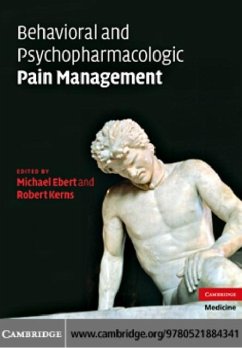Behavioral and Psychopharmacologic Pain Management (eBook, PDF)
Redaktion: Ebert, Michael H.


Alle Infos zum eBook verschenken

Behavioral and Psychopharmacologic Pain Management (eBook, PDF)
Redaktion: Ebert, Michael H.
- Format: PDF
- Merkliste
- Auf die Merkliste
- Bewerten Bewerten
- Teilen
- Produkt teilen
- Produkterinnerung
- Produkterinnerung

Hier können Sie sich einloggen

Bitte loggen Sie sich zunächst in Ihr Kundenkonto ein oder registrieren Sie sich bei bücher.de, um das eBook-Abo tolino select nutzen zu können.
Pain is the most common symptom bringing a patient to a physician's attention. Physicians training in pain medicine may originate from different disciplines and approach the field with varying backgrounds and experience. This book captures the theory and evidence-based practice of behavioral, psychotherapeutic and psychopharmacological treatments in modern pain medicine. The book's contributors span the fields of psychiatry, psychology, anesthesia, neurology, physical medicine and rehabilitation, and nursing. Thus the structure and content of the book convey the interdisciplinary approach that…mehr
- Geräte: PC
- mit Kopierschutz
- eBook Hilfe
- Größe: 7.74MB
- FamilySharing(5)
![Schizo-Obsessive Disorder (eBook, PDF) Schizo-Obsessive Disorder (eBook, PDF)]() Michael PoyurovskySchizo-Obsessive Disorder (eBook, PDF)107,95 €
Michael PoyurovskySchizo-Obsessive Disorder (eBook, PDF)107,95 €![Autism and Pervasive Developmental Disorders (eBook, PDF) Autism and Pervasive Developmental Disorders (eBook, PDF)]() Autism and Pervasive Developmental Disorders (eBook, PDF)42,95 €
Autism and Pervasive Developmental Disorders (eBook, PDF)42,95 €![Forward-looking qualities of Global Studies (eBook, PDF) Forward-looking qualities of Global Studies (eBook, PDF)]() Forward-looking qualities of Global Studies (eBook, PDF)132,95 €
Forward-looking qualities of Global Studies (eBook, PDF)132,95 €![Routledge Handbook of Physical Activity and Mental Health (eBook, PDF) Routledge Handbook of Physical Activity and Mental Health (eBook, PDF)]() Routledge Handbook of Physical Activity and Mental Health (eBook, PDF)61,95 €
Routledge Handbook of Physical Activity and Mental Health (eBook, PDF)61,95 €![Prevention and Management of Violence (eBook, PDF) Prevention and Management of Violence (eBook, PDF)]() Prevention and Management of Violence (eBook, PDF)41,95 €
Prevention and Management of Violence (eBook, PDF)41,95 €![Stahl's Essential Psychopharmacology (eBook, PDF) Stahl's Essential Psychopharmacology (eBook, PDF)]() Stephen M. StahlStahl's Essential Psychopharmacology (eBook, PDF)89,95 €
Stephen M. StahlStahl's Essential Psychopharmacology (eBook, PDF)89,95 €![Prescriber's Guide: Antipsychotics (eBook, PDF) Prescriber's Guide: Antipsychotics (eBook, PDF)]() Stephen M. StahlPrescriber's Guide: Antipsychotics (eBook, PDF)30,95 €
Stephen M. StahlPrescriber's Guide: Antipsychotics (eBook, PDF)30,95 €-
-
-
Dieser Download kann aus rechtlichen Gründen nur mit Rechnungsadresse in A, B, BG, CY, CZ, D, DK, EW, E, FIN, F, GR, HR, H, IRL, I, LT, L, LR, M, NL, PL, P, R, S, SLO, SK ausgeliefert werden.
- Produktdetails
- Verlag: Cambridge University Press
- Erscheinungstermin: 25. November 2010
- Englisch
- ISBN-13: 9780511911576
- Artikelnr.: 38206982
- Verlag: Cambridge University Press
- Erscheinungstermin: 25. November 2010
- Englisch
- ISBN-13: 9780511911576
- Artikelnr.: 38206982
- Herstellerkennzeichnung Die Herstellerinformationen sind derzeit nicht verfügbar.
Robert D. Kerns; 2. The process of pain management June Dahl; 3. The
biopsychosocial model of pain and pain management Dennis C. Turk, Hilary
Wilson and Kimberly S. Swanson; Part II. The Assessment of Pain: 4.
Comprehensive pain assessment: the integration of biopsychosocial
principles John J. Sellinger, Stephanie C. Wallio, Elizabeth A. Clark and
Robert D. Kerns; 5. Assessment of functioning and disability in pain
syndromes Stacy C. Parenteau and Jennifer A. Haythornthwaite; 6. Assessment
of pain and psychiatric comorbidities Jon Streltzer; 7. Assessment of
emotional functioning in persons with pain Robert D. Kerns and Renata
Okonkwo; Part III. Psychopharmacological, Behavioral, and Psychotherapeutic
Approaches: 8. Interdisciplinary pain rehabilitation programs Cynthia O.
Townsend, Jeffrey D. Rome, Barbara K. Bruce and W. Michael Hooten; 9.
Pharmacological approaches to pain management Robin M. Gallagher; 10.
Chronic opioid therapy in pain management Howard S. Smith and Charles E.
Argoff; 11. Behavioral therapeutic interventions in pain management Steven
H. Sanders; 12. Cognitive behavioral therapy in pain management John D.
Otis, Donna B. Pincus and Mary E. Murawski; 13. Non-pharmacological
neuromodulatory approaches to pain management Gabriel Tan, Mark P. Jensen,
Tam K. Dao, Brenda Stoelb and Jay Gunkelman; 14. Cognitive coping
strategies in pain management Laura E. Pence, Beverly E. Thorn and Amber M.
Davis; 15. Couple and family psychotherapeutic approaches to pain
management Annmarie Cano, Jaclyn Heller Issner and Courtney L. Dixon; 16.
Psychopharmacological and psychotherapeutic approaches to pain management
Raphael J. Leo and Wendy J. Quinton; Part IV. Integrative Approaches to the
Management of Painful Medical Conditions: 17. Management of spinal pain
Gerald W. Grass; 18. Management of musculoskeletal pain Akiko Okifuji and
Bradford D. Hare; 19. Management of pain in arthritis Raphael J. Leo and
Thomas J. Romano; 20. Management of neuropathic pain Robert L. Ruff and
Suzanne S. Ruff; 21. Management of headache pain Donald B. Penzien, Morris
Maizels and Jeanetta C. Rains; 22. Management of pain in palliative
medicine Victor T. Chang, Brooke Myers-Sorger, Lawrence J. Weinberger, Mark
E. Jones and Ellyn Poltrock Stein; 23. Pain-associated disability syndrome
in children and adolescents Gerard A. Banez; 24. Management of pain in
geriatric patients Stephen Thielke and M. Carrington Reid; Part V.
Practice, Policy, and Research: 25. Policy and practice issues in pain
management Samantha Boris-Karpel; 26. Diversity and disparities in pain
management Carmen R. Green and Alexandra S. Bullough; 27. Directions in
pain research: contemporary questions and methods David A. Williams and
Daniel J. Clauw; 28. Ethics and pain management Ingra Schellenberg and Mark
D. Sullivan; 29. Future directions of the field of pain management Michael
H. Ebert and Robert D. Kerns; Index.
Robert D. Kerns; 2. The process of pain management June Dahl; 3. The
biopsychosocial model of pain and pain management Dennis C. Turk, Hilary
Wilson and Kimberly S. Swanson; Part II. The Assessment of Pain: 4.
Comprehensive pain assessment: the integration of biopsychosocial
principles John J. Sellinger, Stephanie C. Wallio, Elizabeth A. Clark and
Robert D. Kerns; 5. Assessment of functioning and disability in pain
syndromes Stacy C. Parenteau and Jennifer A. Haythornthwaite; 6. Assessment
of pain and psychiatric comorbidities Jon Streltzer; 7. Assessment of
emotional functioning in persons with pain Robert D. Kerns and Renata
Okonkwo; Part III. Psychopharmacological, Behavioral, and Psychotherapeutic
Approaches: 8. Interdisciplinary pain rehabilitation programs Cynthia O.
Townsend, Jeffrey D. Rome, Barbara K. Bruce and W. Michael Hooten; 9.
Pharmacological approaches to pain management Robin M. Gallagher; 10.
Chronic opioid therapy in pain management Howard S. Smith and Charles E.
Argoff; 11. Behavioral therapeutic interventions in pain management Steven
H. Sanders; 12. Cognitive behavioral therapy in pain management John D.
Otis, Donna B. Pincus and Mary E. Murawski; 13. Non-pharmacological
neuromodulatory approaches to pain management Gabriel Tan, Mark P. Jensen,
Tam K. Dao, Brenda Stoelb and Jay Gunkelman; 14. Cognitive coping
strategies in pain management Laura E. Pence, Beverly E. Thorn and Amber M.
Davis; 15. Couple and family psychotherapeutic approaches to pain
management Annmarie Cano, Jaclyn Heller Issner and Courtney L. Dixon; 16.
Psychopharmacological and psychotherapeutic approaches to pain management
Raphael J. Leo and Wendy J. Quinton; Part IV. Integrative Approaches to the
Management of Painful Medical Conditions: 17. Management of spinal pain
Gerald W. Grass; 18. Management of musculoskeletal pain Akiko Okifuji and
Bradford D. Hare; 19. Management of pain in arthritis Raphael J. Leo and
Thomas J. Romano; 20. Management of neuropathic pain Robert L. Ruff and
Suzanne S. Ruff; 21. Management of headache pain Donald B. Penzien, Morris
Maizels and Jeanetta C. Rains; 22. Management of pain in palliative
medicine Victor T. Chang, Brooke Myers-Sorger, Lawrence J. Weinberger, Mark
E. Jones and Ellyn Poltrock Stein; 23. Pain-associated disability syndrome
in children and adolescents Gerard A. Banez; 24. Management of pain in
geriatric patients Stephen Thielke and M. Carrington Reid; Part V.
Practice, Policy, and Research: 25. Policy and practice issues in pain
management Samantha Boris-Karpel; 26. Diversity and disparities in pain
management Carmen R. Green and Alexandra S. Bullough; 27. Directions in
pain research: contemporary questions and methods David A. Williams and
Daniel J. Clauw; 28. Ethics and pain management Ingra Schellenberg and Mark
D. Sullivan; 29. Future directions of the field of pain management Michael
H. Ebert and Robert D. Kerns; Index.







